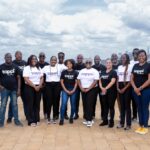Abraham Malek: Redefining Possibilities in South Sudan
As the final chords of a popular song drift away, the host at Radio Miraya studio adjusts his headphones, tapping the soundboard in rhythm. Leaning into the microphone, his voice—warm, smooth, and practiced—fills the airwaves.
“Those were my guests this evening, the brothers Ayoub and Shougi. Welcome to the Weekend Mix with me, Abraham Malek…” His seamless transition between English and Arabic connects South Sudan’s diverse listeners, but behind the voice lies a story of resilience and determination.
Abraham’s journey began in the cattle camps of Twic, Warrap, where he was born into a family of herders. However, a childhood accident altered his life trajectory. Suffering a seemingly minor injury that worsened over time, Abraham found himself with a dangerous wound in his left leg. In a society where physical strength dictated a boy’s future, this setback seemed insurmountable.
“It was just a small accident,” Abraham recalls. “But the lack of medical treatment in the village made it worse. My father had to make sacrifices to send me to Khartoum for proper care.”
This journey became a pivotal moment in Abraham’s life. Under his uncle’s care in Khartoum, he began attending school.
“I didn’t realize it then, but that injury changed everything,” he reflects. “I would never have had the opportunity to go to school otherwise.”
Living with a visible disability brought its own challenges, with stigma following him everywhere. Determined to surpass societal expectations, Abraham resolved to excel in his studies, consistently ranking among the top three in his class.
At the age of 13, he discovered a passion for communication, becoming a sought-after emcee for school events and a voice for his community. “The microphone became my tool for proving my worth beyond my disability,” he says.
Years later, Abraham earned a postgraduate degree in media studies and launched Al Masir, South Sudan’s first Arabic-language newspaper. Today, he produces Radio Miraya’s Weekend Mix, engaging audiences across the country through music, conversation, and community involvement.
Beyond the newsroom, Abraham embraces cycling as a member of the Juba Cycling Club, challenging stereotypes about physical disabilities. Despite not fitting the typical image of a cyclist, he completed a grueling 150-kilometer ride to Terekeka and back, demonstrating his determination and resilience.
As the Club’s secretary for information and public relations, Abraham envisions creating opportunities for other cyclists in South Sudan, including regional training programs and participation in international competitions.
For Abraham, cycling and journalism symbolize movement, transformation, and freedom. “Disability does not equate to inability,” he emphasizes. “It’s about embracing our differences and showcasing our true strength to the world.”
From his humble beginnings in cattle camps to his current roles in media and sports, Abraham continues to defy expectations and redefine what’s possible. “It’s not about overcoming disability,” he asserts. “It’s about embracing it and demonstrating that our unique qualities are a source of strength.”
This inspiring story of resilience and determination is a testament to Abraham Malek’s unwavering spirit and his commitment to breaking barriers in South Sudan.
This article is distributed by APO Group on behalf of the United Nations Mission in South Sudan (UNMISS).





